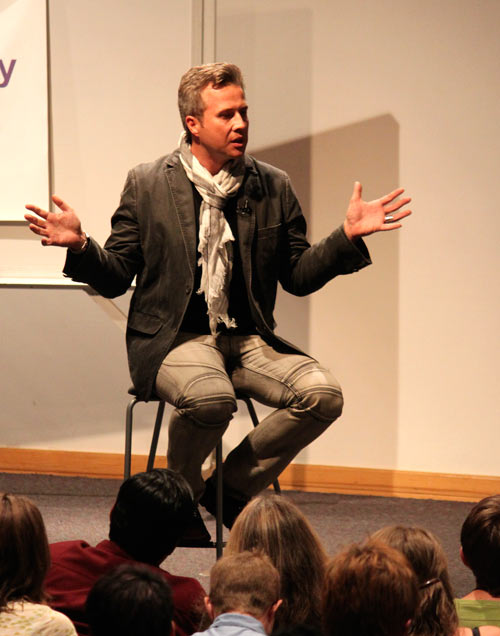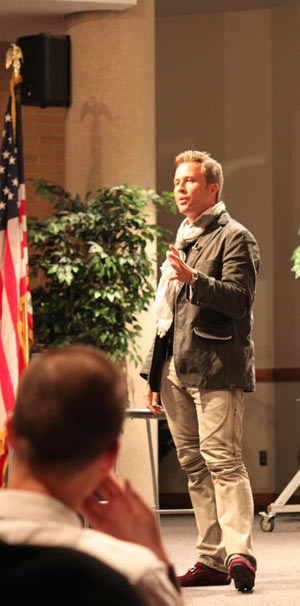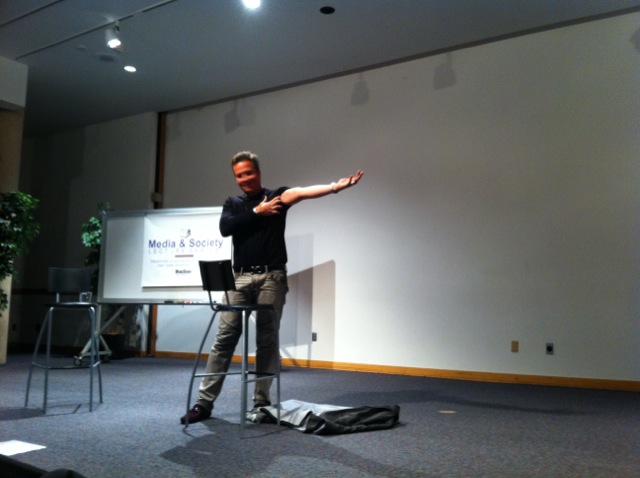Gay and LDS: ‘Are there not very many people like us?’
October 23rd, 2010 Posted in Arts and LifeFilmmaker Reed Cowan’s Q&A plays to a packed, impassioned audience after screening of 8:The Mormon Proposition.
Story by Satenik Sargsyan
Photos by Alison Ostler
LOGAN—The audience of more than 400 burst into applause when a girl with big eyes and long dark hair approached the microphone, forcing her simple question out through a rainfall of tears: “Are there not very many people like us, or do we just not talk?”
 The mission was accomplished for Reed Cowan, director of 8:The Mormon Proposition. The Utah State University screening of the documentary reached out to the soul of this Latter-day Saint girl whose brother had come out to his family as gay. And she wasn’t the only one in the audience.
The mission was accomplished for Reed Cowan, director of 8:The Mormon Proposition. The Utah State University screening of the documentary reached out to the soul of this Latter-day Saint girl whose brother had come out to his family as gay. And she wasn’t the only one in the audience.
• Click here for full video of Cowan’s conversation with the USU community on being gay and Mormon.
The Eccles Conference Center auditorium was exploding with people: Mormons, homosexuals, allies or just curious passers-by; some sitting, some trying to get comfortable standing for three hours. Some opposed the movie, others supported it. Some laughed, many cried, while others disagreed. But everyone present agreed upon one thing: the evening was full of exploring, learning and gaining respect for both sides of the argument.
USU graduate and Roosevelt native Cowan, wearing a “fiery but fun” personality and purple shoes in memory of recent gay teen suicides, had returned home to Utah for exactly this: to present the challenges of being gay in a predominantly LDS community and the involvement of the LDS church in California’s 2008 Proposition 8 campaign, which outlawed same-sex marriage.
“I didn’t make this movie to attack the Mormon Church,” Cowan said. “I did it because I wanted the pain of Proposition 8 to serve some purpose.”
Cowan called making the movie “birthing of a new reality.” The question-and-answer session, intended to discuss the movie, turned into an active dialogue between the audience and Cowan, who was open to sharing his experiences with spectators.
“Reed Cowan is an amazing individual,” said the president of USU gay-straight alliance, Athena Dupont. “He kept the tone of his film, speech and responses absolutely respectful while still portraying his own passions and opinions to a diverse crowd.”
While some LDS members of the audience spoke out about the difficulties of their family members coming out as gay and asked for  advice, it was important for Cowan, a former member of the church, to tell his story.
advice, it was important for Cowan, a former member of the church, to tell his story.
“I lost communication with members of my family after making the movie,” Cowan said. “I have some family members who I do not speak to anymore as a result of the film, and for that I have a lot of pain.”
Cowan was briefly married before coming out as gay, and he and his partner were raising his son, Wesley, before the 4-year-old was killed in a backyard swingset accident in Salt Lake City.
Cowan said his family accepted his being gay and having a partner, “and they were very supportive of us after the death of Wesley. But that after the movie got more publicity, that is when a bomb was dropped on my family relationships.” He said he is still in close communication with his mother.
Other LDS audience members engaged Cowan in a theological debate. In the movie, the LDS gay couples’ remarks about going to hell were of the greatest concern to devoted Mormons. The doctrine of the LDS church rejects the existence of hell. The followers of the faith believe in three degrees or kingdoms of glory in afterlife: celestial, terrestrial and telestial. It is believed that gays will go to telestial kingdom.
In response to the remark that the term “hell” was incorrect in the context of LDS doctrine, Cowan said that “being cut out from [his] loved ones and family,” as the telestial kingdom is described, is “hell” for him and other homosexual couples, featured in the film.
“But I saw something human and beautiful in the stories that we saw,” he said.
As the topic swung away from discussing Proposition 8 and focused more on the LDS church’s views on homosexuality, Cowan called Elder Boyd K. Packer’s recent statements about homosexuality “devastating.”
“I have held the hands of dying kids,” Cowan said. “Most of the time, the last words they hear is of those general authorities telling them that they can change.
“Those kids die trying,” he added.
 The LDS church leaders’ views were reflected in the interviews of 21 USU students of the LDS faith. While none of the interviewed students from a random sample had heard about the screening of the movie, they all believed that homosexuality is a “weakness that can be overcome.”
The LDS church leaders’ views were reflected in the interviews of 21 USU students of the LDS faith. While none of the interviewed students from a random sample had heard about the screening of the movie, they all believed that homosexuality is a “weakness that can be overcome.”
A junior in agribusiness, Natalie Dobson, who called herself “Mormon through and through,” said that “it’s not a big deal” what movies are made as long as they contain accurate factual data and are balanced.
However, Dobson believes that people are not born gay but rather “it’s a choice” that an individual makes. In her view, people should “ask God to overcome it,” which is the LDS church position.
“It seems like being gay or lesbian these days is something so easy to let yourself be,” Dobson said. “We all have our weaknesses that Satan tempts us with because he knows that we are leaning towards certain things.” She compared being a homosexual to one of her own weaknesses: “not being prone to doing homework.”
Dobson was one of the few LDS students surveyed who allowed her name appear next to her interview.
Alyssa Mortensen, a junior in music education and special education who is openly lesbian, said that if she had to choose she “would not choose to be gay” because of the societal pressure and the fear of losing her family.
A freshman from St. George, Nate Needham, was another member of the LDS church who did not mind having his name used. He said that while the church doesn’t “completely discourage gays,” it discourages “immoral actions between a man and a man and a woman and a woman,” implying “sexual relationships.”
Another student, who preferred to remain anonymous, said that she was convinced that homosexuality is curable because her uncle “was gay for 30 years but is now happily married to a woman with three beautiful children.”
In attempts to “cure” themselves, young gays “drink, do drugs, and commit suicide,” Cowan said. “There is no safe place for a young gay person to go. It breaks my heart.”
In response to his question where the GLBT members of the audience go for help, an individual shouted out, “It should be family.”
NW
Tags: film, gay, LDS, Prop 8, Reed Cowan

2 Responses to “Gay and LDS: ‘Are there not very many people like us?’”
By notimportant on Oct 23, 2010
The girls hair was brown…
and her family HAD accepted him…
By Correction: on Oct 25, 2010
The tearful girl who asked the final question in Thursday’s Q&A with director Reed Cowan came from an accepting family, but her question was all the more poignant because of it.
To give her question context, she explained that her brother had come out as gay and that her firmly and faithfully LDS family had chosen to accept and love him as he was, regardless of sexual orientation. Watching the movie and in light of Boyd K. Packer’s hate speech in the LDS General Conferences, she cried because she could not imagine her family abandoning her brother as others had abandoned their children.
“Are there not very many people like us, or do we just not talk?”
Reed Cowan’s heartfelt response was, “You just did.”